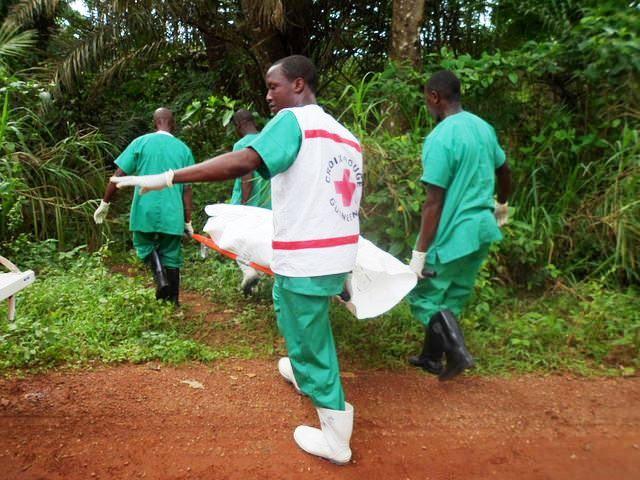Leaked documents from the World Health Organization (WHO) suggest that the agency delayed declaring a global health emergency for Ebola for 2 months, partly because of political reasons, according to an investigation by the Associated Press (AP)
In other developments, a newly confirmed Ebola case in Liberia's capital was announced today after 3 weeks without one, which will delay the country's quest for Ebola-free status.
E-mails, memos show hesitations
According to internal WHO e-mails obtained by the AP, senior officials in the WHO's African regional office proposed stronger action from headquarters in June at a time when the disease was mainly centered in Guinea but had already become the deadliest Ebola outbreak ever recorded.
The AP investigation found that although the WHO's top leaders were warned about the Ebola situation, they hesitated to call an emergency out of fear of angering the outbreak countries, hurting the nations' mining interests, or complicating pilgrimages to Mecca in October.
Sylvie Briand, MD, MPH, PhD, director of pandemic and epidemic diseases with the WHO, in a Jun 5 e-mail told a colleague who raised the idea of calling an emergency, "It may be more effective to use other diplomatic means for now."
A few days later, WHO Director-General Margaret Chan, MD, MPH, got a memo warning that Ebola posed a threat to Guinea Bissau, Ivory Coast, and Mali, but it went on to say declaring a public health emergency or even putting together an emergency committee to discuss it might be seen as a "hostile act," according to the AP's findings.
Some experts and former WHO staff dismissed the WHO's reasoning, though others quoted in the AP story said declaring an emergency might not have fixed the problems or could have made the situation worse. However, declaring an emergency acts as a distress signal that can galvanize action.
About a month after the WHO's emergency declaration on Aug 8, the United Nations Security Council met and adopted a special mission for Ebola, which ramped up logistics needed to battle the outbreak and helped sway other nations to send resources and health workers to West Africa.
The AP today posted six of the documents it received that show the warnings and hesitations during the 2-month delay.
The WHO has acknowledged the slow response to the Ebola epidemic but has said the unprecedented scope of the event overwhelmed its capacities, especially at a time when it was juggling a polio emergency, the MERS-CoV (Middle East respiratory syndrome coronavirus) outbreak, and a spate of humanitarian crises.
In late January the WHO's executive board approved a set of proposals for improving its ability to manage global health emergencies, and on Mar 9 Chan commissioned an independent expert panel to assess its response to the Ebola outbreak, with its first report due in time for the World Health Assembly in May.
Liberia reports new Ebola case
Meanwhile, after going 3 weeks without a confirmed Ebola case, Liberian health officials said today that a new infection has been detected in Monrovia, the country's capital, according to a separate AP report.
Francis Kateh, who directs Liberia's Ebola incident management team, said the patient's first test was positive and that a second test will be done to confirm the findings. Citing another official, the AP said the sick woman was taken to an Ebola treatment center and it's not clear how she was infected, as she was not on a list of known contacts.
In its latest report on the outbreak, the WHO on Mar 18 said Liberia's last patient had a final negative test for Ebola 15 days earlier and that two 21-day incubation periods must pass without a new case for transmission to be considered over.
A call for immunization action
In other developments today, the WHO called for a scale-up in routine immunization activities in the three main outbreak countries due to a growing risk of measles, pertussis, and other vaccine-preventable diseases.
Jean-Marie Okwo-Bele, MD, MPH, director of immunization, vaccines, and biologicals at the WHO, said in a statement, "We are calling for the intensification of routine immunization services in all areas, and for mass measles vaccination campaigns in areas that are free of Ebola transmission."
The WHO said a focus on the outbreak response has reduced vaccination coverage in Guinea Liberia, and Sierra Leone. It warned that even short disruptions in immunization activities can increase the threat of infectious disease outbreaks.
Case numbers rise
In an update on outbreak numbers, the WHO said today that the region's total has grown to 24,753 confirmed, probable, and suspected cases, with the number of deaths rising to 10,216.
The tallies include data from Guinea and Sierra Leone as of Mar 18 and Liberia as of Mar 17. They reflect an increase of 10 cases and 20 deaths since the WHO's report yesterday.
See also:
Mar 20 AP story on WHO decisions
AP selection of internal WHO memos and e-mails
Mar 20 AP story on Liberian case
Mar 20 WHO statement
Mar 20 WHO update


















